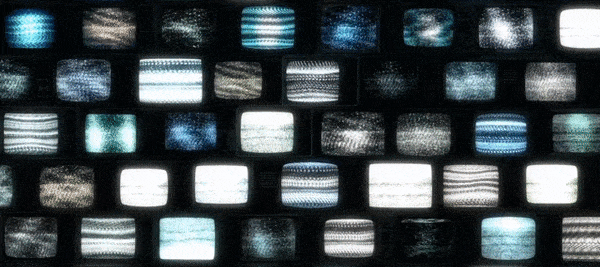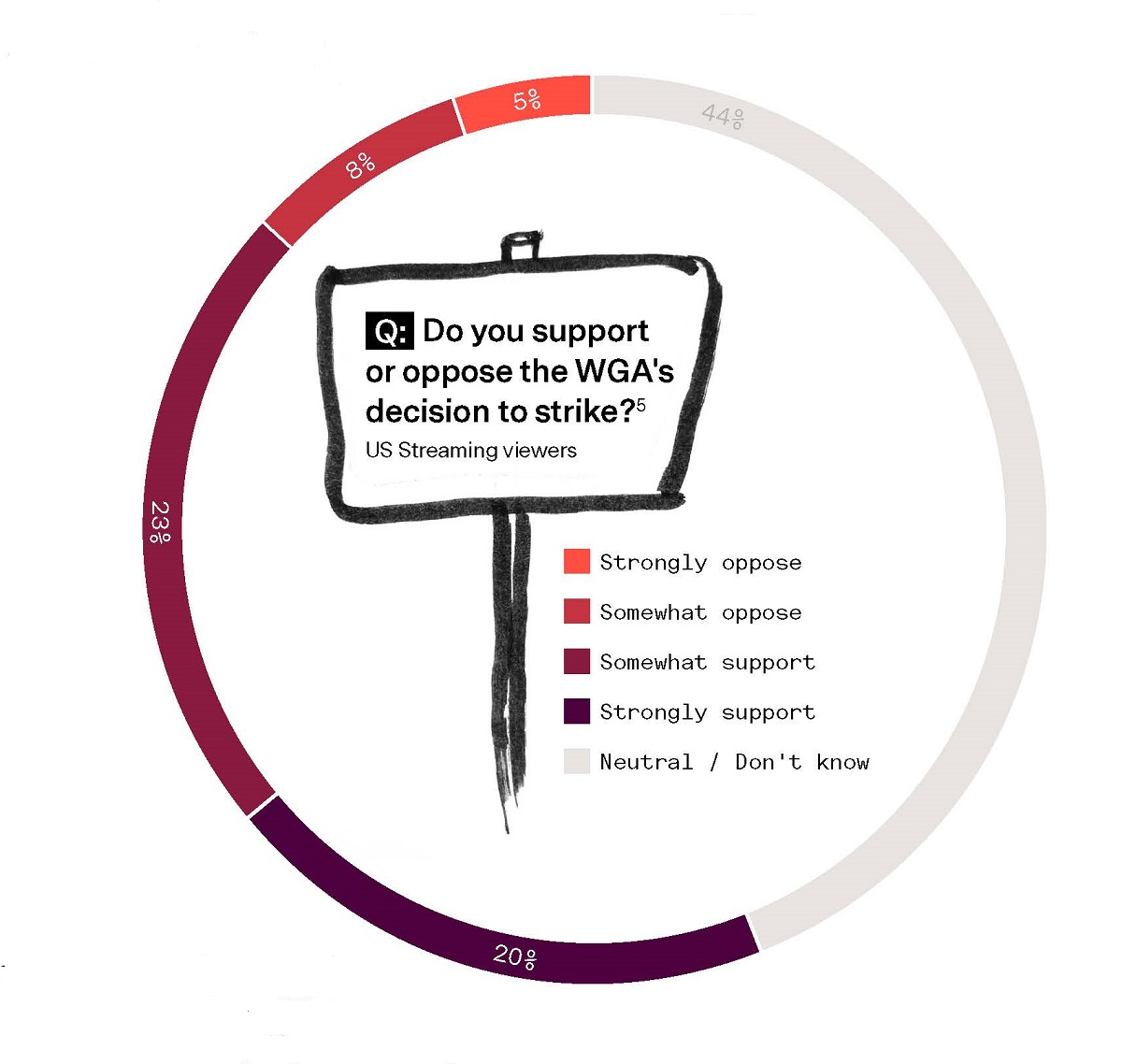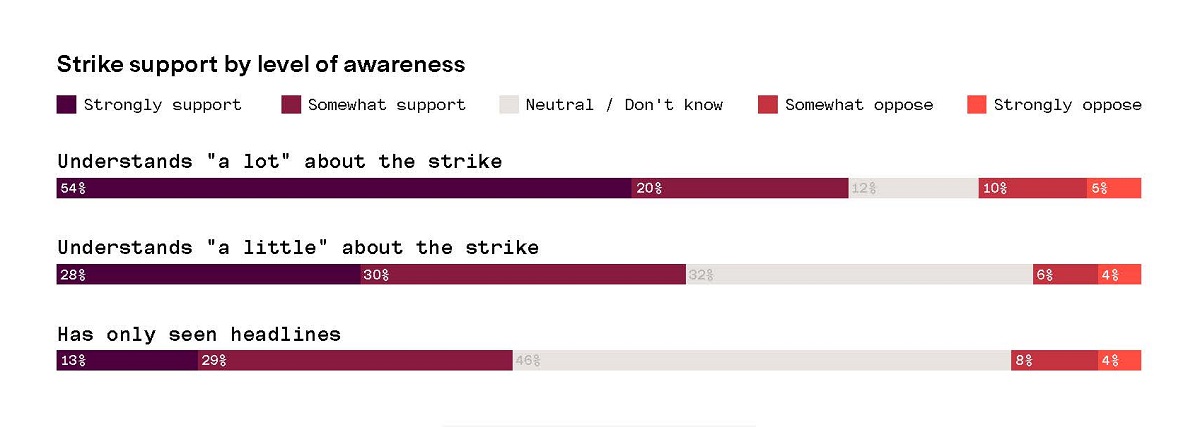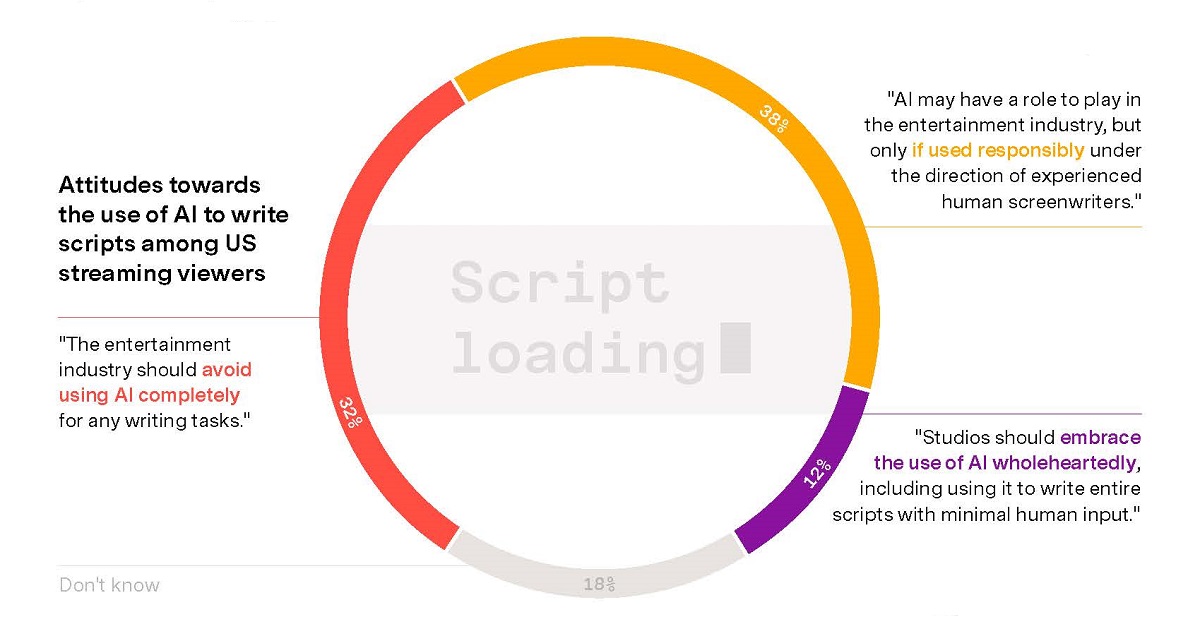
TL;DR
- A new report titled “Reading Between the [Picket] Lines” from global insights and strategy firm NRG reveals that streaming viewers largely support the WGA strike and are cautiously open to the use of AI in the entertainment industry.
- The findings are based on a survey of 3,000 US consumers, aged 13-54, who subscribe to at least one streaming service and consume a minimum of four hours of streaming content per week.
- While more than 60% of respondents are aware of the strike, only 13% feel they have a comprehensive understanding of the strike and its underlying reasons.
- Among those who feel they understand “a lot” about the strike, a staggering 74% say that they support the WGA’s decision to strike.
- When it comes to the role of generative AI in the entertainment industry, viewers are yet to fully make up their minds about where they stand, yet more than two-thirds expressed concern about the use of AI in Hollywood.
READ MORE: New data on the writers’ strike and use of AI in Hollywood (NRG)
As the Writers Guild of America strike continues to unfold, a new report reveals that streaming viewers are both supportive of the writers but also cautiously open to the role of AI in the entertainment industry.
The report, “Reading Between the [Picket] Lines,” from global insights and strategy firm NRG, is based on a study of 3,000 US consumers ages 13-54 who subscribe to at least one streaming service and watch a minimum of four hours of streaming content per week.
While public understanding of the WGA strike remains low, the report found, there is already strong support for the writers. More than 60% of respondents indicated awareness of the strike, but only 13% said they understand “a lot” about the strike and the reasons behind it. However, among those who feel they understand “a lot” about the strike, a staggering 74% say that they support the WGA’s decision to strike. Forty-three percent of viewers say that they either “strongly” or “somewhat” support the decision to strike — more than three times the number who oppose the strike (13%).
As media coverage continues, it’s likely that sympathy for the WGA’s position will grow — especially in the early stages of the strike while studios still have content to release and most viewers don’t yet feel personally affected by the disruption to the industry. The most immediate impact of the strike has been the suspension of late-night shows; however, only 10% of streaming viewers say this is an issue that they personally care about.
Interestingly in these politically divided times, support for the strike appears to transcend political divisions. Consumers who self-identify as liberal are among the most likely to back the strike, with 57% in support and only 10% opposed; but even conservatives say they support the strike by a two-to-one margin (34% support vs. 16% oppose).
When it comes to the role of AI in the entertainment industry — one of the central issues at stake in the strike — viewers are yet to fully make up their minds about where they stand, yet more than two-thirds expressed concern about the use of AI in Hollywood.
“To me that’s an early warning sign of a potential backlash if studios are seen to be using AI specifically for the strike,” Katie Kelley, NRG’s executive vice president of content and strategy and a former vice president of market research at Paramount Pictures, told Lucas Manfredi at TheWrap.
“That would suggest that as the media coverage kind of continues, maybe builds around the strike and those motivations do become maybe a little bit clearer to consumers that they are able to make up their minds,” she continued. “It would suggest that as awareness builds, the same level of support will probably pan out in the long run.”
While there’s a contingent who are strongly opposed to the use of AI to write scripts, most viewers are willing to at least wait and see what AI-supported content looks like before deciding how to feel about it.
More than a quarter (28%) say they’d be less interested in watching a show if they found out it was written with the help of AI, while only 13% say that they would be more interested. Overall, however, a majority of viewers — nearly 6 in 10 — say it would have no impact on their willingness to watch a show. This suggests that, for the most part, consumers are still making up their minds about whether they want to lean in or out of AI-generated content.
Only 12% of those surveyed believe that studios should fully adopt AI to script content with minimal human intervention. In contrast, a third of the respondents (32%) advocate for a complete avoidance of AI in the entertainment industry. Interestingly, a significant 38% see a potential role for AI in the sector, but insist that its use should be responsible and guided by seasoned human screenwriters.
“When you add those together,” Kelly noted, “it means that more than two-thirds either want the industry to avoid using it or only use it under the discretion of humans. “I think that’s a compelling data point.”
For generative AI to successfully carve out a space for itself in the entertainment industry, it’s critical that viewers see it as a tool to support human screenwriters — not as threat to their livelihoods. If studios are seen as turning to AI to replace striking writers, this could create a strong public backlash against the technology, Kelly said.
“If studios are generally interested in exploring this new technology, I think they need to tread a little carefully during the strike period.”





